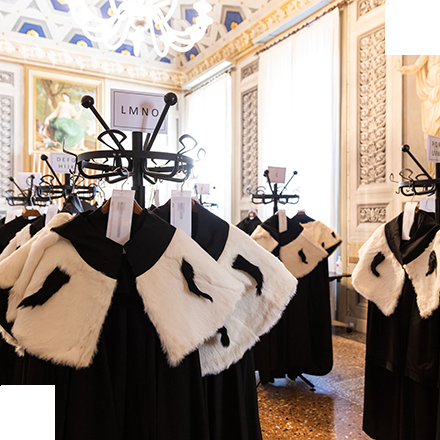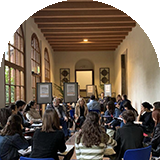Università Cattolica del Sacro Cuore Largo A. Gemelli, 1 - 20123 Milan
Manuela Soffientini
General Manager Cluster Italia Electrolux
She is the first woman to lead Electrolux in our country and the only one to hold such an important position at European level. Manuela Soffientini, from Milan, graduated from the Faculty of Economics in Largo Gemelli, since 2012 she has been managing director Italy of the multinational that holds one of the largest shares of the world market for household appliances. Hired by the Swedish group during a state of crisis, it protected the positions of workers in Italy and relaunched the business.
His career started from the cloisters of the University, without a fixed nail in his head, but trying to clarify his goals along the way. "I knew that Università Cattolica would offer me an open path, without asking me to decide immediately what kind of specialization to take," he says. "During my studies, I met what would become my passion: marketing. I was fascinated by this teaching and the desire to pursue a career in this field was born in me. And so it was. From that moment on, everything became much clearer."
How much did your studies influence your career?
"They were fundamental. When I attended university, the course of study was not as rich in specific teachings as it is today, but they were enough to prepare me in the best possible way and provide me with the tools to have a clear path to take professionally. The University allowed me to understand and enhance my approach to marketing and communication."
After your studies, how did you enter the world of work?
"After graduating, I was contacted directly by companies that immediately included me in a recruitment program. All this was also thanks to Università Cattolica, considered by the most important multinationals to be one of the best universities in terms of student preparation and quality of teaching. And that's where my career path began."
He has held important roles in several multinationals. Since 2012 he has been CEO of Electrolux, taking over from the previous one at a difficult time for the company. How were the years of crisis managed?
"I joined the company a little before the state of crisis was declared. Electrolux's choice was a break with a very traditional management model, which rewarded above all continuity with Zanussi's management. However, it was also a very strong choice in terms of gender change at the top. In fact, I was the first woman to take on such an important position at Electrolux and I still am in Europe. The discontinuities were managed not without conflicts but with great caution on the part of the managers, to protect an important reality at a local level and for the entire Italian manufacturing industry."
Between the end of 2015 and the first months of 2016, Electrolux's state of crisis came to an end. How was this positive moment perceived?
"There has been a great contribution from some long-standing managers who have worked professionally and have been open to the new demands of the company. We are very pleased to see that Electrolux, from an industrial point of view, has found a balance that allows it to protect the positions of workers in Italy. The situation of the business is different: it has certainly improved a lot, but the growth path, which sees us committed to achieving high levels of profitability, is still long."
What does it mean to be a woman manager in our country?
"I've never found any particular obstacles or closed-mindedness. Of course, if a woman has a personal or family project, difficulties can arise. This is a point that needs to be balanced and, having had children, I think I have managed it very calmly, without compromising my personal needs too much. Then life is made up of encounters, luck and opportunities that you have to be able to seize. However, I cannot say that I have encountered discriminatory barriers or limitations to my work. Today, more and more companies are led by women. This confirms that the space is available and that there are no cultural barriers as strong as many believe."
Are there differences in the male-female approach to running a company?
"I don't think so. The ways in which a given role is performed, such as that of the CEO, are always the same, as are the skills that must be brought into play. What can change is the touch: a woman may move differently in terms of interpreting leadership, relying less on authority and more on skills and strategic vision. I honestly think I'm no different from my predecessors in terms of style, but you'd have to ask my collaborators."
Electrolux is a Swedish multinational company. How is the way of working changing in Northern Europe?
"It's great to work with Swedes. Definitely one of the most positive experiences I have ever had from both a professional and human point of view. In general, working with Northern Europeans is extremely rewarding: a rigorous and committed experience, but without sacrificing any aspect of relevance for the smooth running of the business. The values that correspond to Electrolux are those that I always feel I promote and share: respect and the ability to value people, despite the fact that the work environment is very competitive."
Driven by what is already happening in Northern Europe, Electrolux is implementing a digital revolution: smart working has recently been introduced in Italy. How was it received?
"People have the opportunity to work a certain number of days from home, setting their own hours, but with availability that must be ensured. Smart working has been very well received by employees, not only women but also men. The chief of staff and I have given this practice a big boost because we are convinced that if people work in an environment that allows them to be more focused and comfortable with their commitments, they can also be more productive. At Electrolux, we are all very much in favour of working from home and we put a lot of pressure on our employees to do so."
After the crisis that has hit the sector in recent years, how do you think the manufacturing industry in Italy can evolve in the future?
"I think the future of industry in our country is very complex. In Italy there are several excellent manufacturing companies, but with problems of competitiveness as far as costs are concerned. A multinational that continues to maintain its position on the Italian territory, from a production point of view, is making a quality choice. But quality is not always competitive in terms of costs, and companies are increasingly forced to balance this factor with a presence in countries where labor costs are much lower. There is also the issue of rigidity: if production cannot fully support the cost of the plants, the flexibility that Italy offers is completely different from that which Eastern European countries can provide."
Given your experience, do you have anything to suggest to the students who now attend the cloisters of Largo Gemelli and the other campuses of the University?
"My advice is to always be ready to face the differences that are posed by multinational contexts, if you want to operate in excellent companies worldwide. Knowing English well is essential. It is also important to be flexible and above all try to make your dreams come true. Everything is easier if you can follow your aspiration."
Presenza, 2017 - Ne ha fatta di strada di Marianna di Piazza






